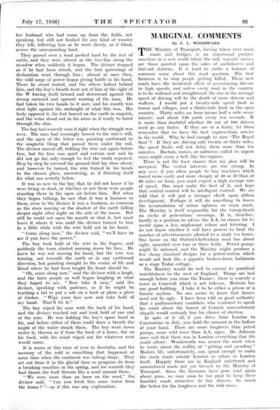MARGINAL COMMENTS
By E. L. WOODWARD
THE Ministry of Transport, having taken over main roads and bridges, is an impersonal pontifex maximus in a new world where the only wayside crosses are those painted upon the sides of ambulances and first-aid stations. It is hard to strike a balance of common sense about this road question. The first business is to stop people getting killed. These new roads have the incidental effect of accustoming drivers to high speeds, and unless every road in the country is to be widened and straightened, the rise in the average speed of driving will be the death of more drivers and walkers. I would put a twenty-mile speed limit in towns and villages, and a thirty-mile limit in the open country. Thirty miles an hour means half a mile every minute, and about 150 yards every ten seconds. It is more than doubtful whether 99 out of 100 drivers need go any faster. If they are in a hurry, let them remember that we have the best express-train service in the world. Why be fool enough to race 'The Royal Scot'? If they are driving only twenty or thirty miles, the speed limits will not delay them more than ten minutes. Doctors, nurses, or midwives called to urgent cases might carry a bell, like fire-engines.
There is not the least chance that my plan will be accepted. The vested interests are too strong. In any case, if you allow people to buy machines which travel more easily and more cheaply at 40 or 50 than at 80 miles an hour, you must expect a high average rate of speed. One must make the best of it, and hope that central control will be intelligent control. We are told that it will put a stronger check upon ribbon development. Perhaps it will do something to lessen the accumulation of minor ugliness on main roads. The Ministry is itself responsible for the turnip-heads on sticks at pedestrians' crossings. It is, therefore, hardly in a position to advise the A.A. to choose for its useful signs a less unpleasant colour and lettering. I do not know whether it will have powers to limit the number of advertisements allowed to a single tea house. One house on the Oxford-Cheltenham road has about eight, sprawled over two or three fields. Petrol pumps might be rationed, and the Ministry might produce a few cheap standard designs for a petrol-station which would not look like a gigantic broken-down bathroom or a stage Tudor cottage.
The Ministry would do well to extend its pontifical watchfulness to the west of England. Things are bad enough before you cross the Tamar ; there is scarcely a town in Cornwall which is not hideous. Bodmin has one good building. I take it to be either a prison or a lunatic asylum. No one seems to know that houses need not be ugly. I have been told on good authority that a parliamentary candidate who ventured to speak his mind about the horror of Cornish nonconformist chapels would certainly lose his chance of election.
In spite of it all, if you drive from London to Constantine in July, you hold the summer in the hollow of your hand. There are more foxgloves than petrol pumps, more wild roses than A.A. signs. Dr. Johnson once said that there was in London everything that life could afford : Wordsworth was nearer the mark when he wrote about the nullity of " getting and spending." Modern life, unfortunately, can spend enough to make the main roads outside London as urban as London itself. Happily there are in England unlettered and unnumbered roads not yet blessed by the Ministry of Transport. Since the Germans have gone • mad again about .guns, we may soon be too poor to keep these humbler roads attractive to fast drivers. So much the better for the foxgloves and the wild roses.














































 Previous page
Previous page